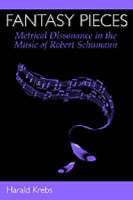
Fantasy Pieces
Metrical Dissonance in the Music of Robert Schumann
Seiten
2003
Oxford University Press Inc (Verlag)
978-0-19-516946-1 (ISBN)
Oxford University Press Inc (Verlag)
978-0-19-516946-1 (ISBN)
This work describes the various categories of metrical conflict that characterize Schumann's work, investigates how states of conflict are introduced and then manipulated and resolved in his compositions, and studies the interaction of such metrical conflict with form, pitch structure, and text.
Fantasy Pieces examines from several vantage points a vital life-force of Robert Schumann's music, namely metrical conflict. Harald Krebs's imaginative yet rigorous study makes use of Schumann's fascinating projections of his own personality--the characters Florestan and Eusebius--as one means of addressing the biographical and aesthetic context of the music.
In counterpoint with the remarks of these personae, Krebs develops an original theory of metrical conflict by adapting the concepts of consonance and dissonance to metrical analysis. He investigates how states of metrical dissonance arise, and shows how they are manipulated and resolved in the course of compositions. He offers new methods for understanding the metrical progressions of entire works or movements, and studies the interaction of metrical conflict with form, with pitch structure, and with the texts of Schumann's vocal works. Krebs includes a wealth of illustrations from the whole range of Schumann's work and offers numerous insights important for performance. In the final chapter, he provides richly detailed studies of pieces by Schumann in various genres, interspersing them with shorter discussions of music by Berlioz, Chopin, Clara Schumann, Ives, and Schoenberg.
This is a book that will appeal not only to students and scholars of music theory, but to all musicians interested in the life, work, and unique personality of Robert Schumann.
Fantasy Pieces examines from several vantage points a vital life-force of Robert Schumann's music, namely metrical conflict. Harald Krebs's imaginative yet rigorous study makes use of Schumann's fascinating projections of his own personality--the characters Florestan and Eusebius--as one means of addressing the biographical and aesthetic context of the music.
In counterpoint with the remarks of these personae, Krebs develops an original theory of metrical conflict by adapting the concepts of consonance and dissonance to metrical analysis. He investigates how states of metrical dissonance arise, and shows how they are manipulated and resolved in the course of compositions. He offers new methods for understanding the metrical progressions of entire works or movements, and studies the interaction of metrical conflict with form, with pitch structure, and with the texts of Schumann's vocal works. Krebs includes a wealth of illustrations from the whole range of Schumann's work and offers numerous insights important for performance. In the final chapter, he provides richly detailed studies of pieces by Schumann in various genres, interspersing them with shorter discussions of music by Berlioz, Chopin, Clara Schumann, Ives, and Schoenberg.
This is a book that will appeal not only to students and scholars of music theory, but to all musicians interested in the life, work, and unique personality of Robert Schumann.
Harald Krebs holds a Ph.D. in music theory from Yale University. He has taught at the University of British Columbia and the University of Wisconsin-Madison, and is currently professor of music theory at the School of Music of the University of Victoria.
1. Nineteenth- and Twentieth-Century Theories of Metrical Conflict ; 2. Metrical Consonance and Dissonance-Definitions and Taxonomy ; 3. Intermezzo I: Influences on Schumann's Metrical Style ; 4. Metrical Progressions and Processes ; 5. Intermezzo II: Metrical Revisions ; 6. Interactions of Metrical Dissonance with Pitch Structure, Form, and Extramusical Elements ; 7. Intermezzo III: Performing Metrical Dissonances ; 8. Carnaval des analyses ; Epilogue: Morning Song
| Erscheint lt. Verlag | 11.12.2003 |
|---|---|
| Zusatzinfo | numerous music examples |
| Verlagsort | New York |
| Sprache | englisch |
| Maße | 160 x 234 mm |
| Gewicht | 590 g |
| Themenwelt | Kunst / Musik / Theater ► Musik ► Klassik / Oper / Musical |
| Kunst / Musik / Theater ► Musik ► Musiktheorie / Musiklehre | |
| ISBN-10 | 0-19-516946-8 / 0195169468 |
| ISBN-13 | 978-0-19-516946-1 / 9780195169461 |
| Zustand | Neuware |
| Haben Sie eine Frage zum Produkt? |
Mehr entdecken
aus dem Bereich
aus dem Bereich


